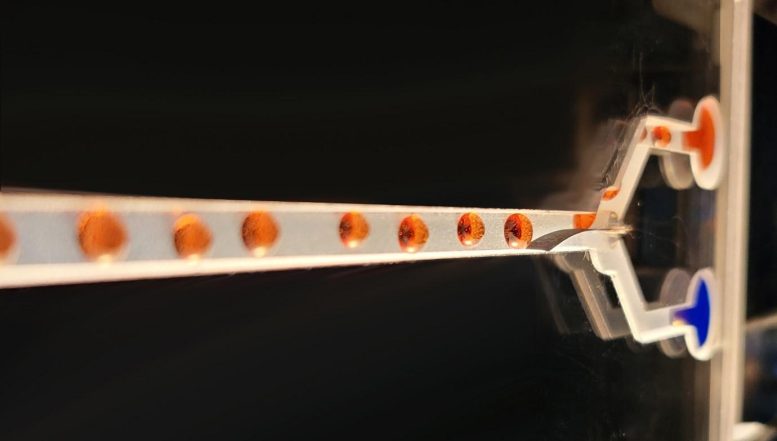
Researchers have developed a soft fluidic switch using ionic polymer artificial muscles, capable of operating at ultra-low power and producing a force 34 times its weight. This breakthrough offers potential applications in soft robotics, biomedical devices, and microfluidics by precisely controlling fluid flow in narrow spaces. The image above depicts the separation of fluid droplets using a soft fluid switch at ultra-low voltage. Credit: KAIST Soft Robotics & Intelligent Materials Lab
Soft robots, medical devices, and wearable devices are now common in our daily routines. Researchers at
Switches based on existing motors were difficult to use within limited spaces due to their rigidity and large size. In order to address these issues, the research team developed an electro-ionic soft actuator that can control fluid flow while producing large amounts of force, even in a narrow pipe, and used it as a soft fluidic switch.

The synthesis and use of pS-COF as a common electrode-electrolyte host for electroactive soft fluid switches. A) The synthesis schematic of pS-COF. B) The schematic diagram of the operating principle of the electrochemical soft switch. C) The schematic diagram of using a pS-COF-based electrochemical soft switch to control fluid flow in dynamic operation. Credit: KAIST Soft Robotics & Intelligent Materials Lab.
The ionic polymer artificial muscle developed by the research team is composed of metal electrodes and ionic polymers, and it generates force and movement in response to electricity. A polysulfonated covalent organic framework (pS-COF) made by combining organic molecules on the surface of the artificial muscle electrode was used to generate an impressive amount of force relative to its weight with ultra-low power (~0.01V).
Achievements of the Research
As a result, the artificial muscle, which was manufactured to be as thin as a hair with a thickness of 180 µm, produced a force more than 34 times greater than its light weight of 10 mg to initiate smooth movement. Through this, the research team was able to precisely control the direction of fluid flow with low power.
Professor IlKwon Oh, who led this research, said, “The electrochemical soft fluidic switch that operates at ultra-low power can open up many possibilities in the fields of soft robots, soft electronics, and microfluidics based on fluid control.” He added, “From smart fibers to biomedical devices, this technology has the potential to be immediately put to use in a variety of industrial settings as it can be easily applied to ultra-small electronic systems in our daily lives.”
Reference: “Polysulfonated covalent organic framework as active electrode host for mobile cation guests in electrochemical soft actuator” by Manmatha Mahato, Mousumi Garai, Van Hiep Nguyen, Saewoong Oh, Sanghee Nam, Xiangrong Zeng, Hyunjoon Yoo, Rassoul Tabassian and Il-Kwon Oh, 13 December 2023, SciTechDaily